
Collaborator Everywhere for Burp Suite Professional has been upgraded with features like editable payloads, a dedicated interaction tab, and persistent storage. These improvements enhance detection and analysis of out-of-band communication, such as SSRF or Host header vulnerabilities. The extension is available in the BApp Store or on GitHub. 2025-9-9 09:31:30 Author: blog.compass-security.com(查看原文) 阅读量:10 收藏
Collaborator Everywhere is a well-known extension for Burp Suite Professional to probe and detect out-of-band pingbacks in web applications.
We developed an upgrade to the existing extension with several new exiting features. Payloads can now be edited, interactions are displayed in a separate tab and stored with the project file. This makes it easier to detect and analyze any out-of-band communication that typically occurs with SSRF or Host header vulnerabilities.
You can find the extension in the BApp Store or on our GitHub repository.1
The Collaborator service in Burp Suite Professional is a handy tool for identifying various misconfigurations and vulnerabilities that do not elicit a direct response but instead trigger a request to another system. This is also referred to as out-of-band communication. Using a dedicated external server that listens to incoming connections on multiple protocols, such requests can be collected in a Burp instance for further inspection.
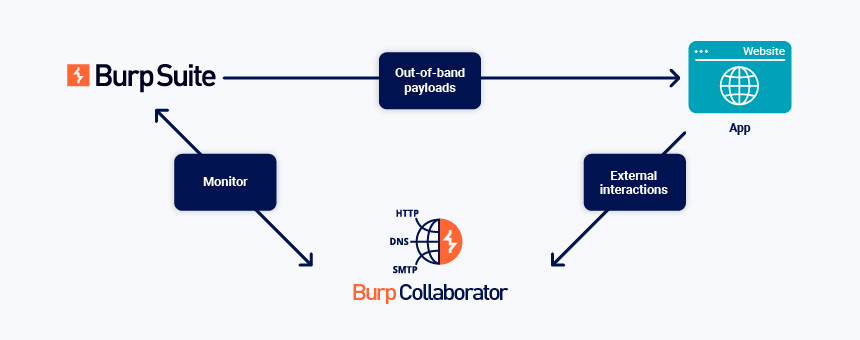
Burp Collaborator generates special URLs and regularly polls the Collaborator server for any incoming requests to those URLs. If the Collaborator server receives a request while Burp Suite is not running, the request is stored until the next poll. This asynchronous pattern is particularly useful for dealing with payloads with delayed execution, such as blind XSS or blind SQL injection.
Original extension
The extension Collaborator Everywhere was initially developed by James Kettle as part of a research project to identify backend vulnerabilities. Acting as a passive scanner, it automatically inserts new Collaborator URLs into various HTTP headers for every in-scope request. As unique payloads are created for each header and URL parameter, any received interaction can be immediately correlated with the originating request and header.
To illustrate what it does, here is a quick example. Given the following request:
GET / HTTP/1.1
Host: 0a190072032d8a6d80141783008800f9.web-security-academy.net
[CUT BY COMPASS]It is then modified with several additional headers:
GET / HTTP/1.1
Host: 0a190072032d8a6d80141783008800f9.web-security-academy.net
[CUT BY COMPASS]
Contact: [email protected]
From: [email protected]
Referer: https://6u1tcw8rgyl8z7nwwqth1xzxbohj58.oastify.com
X-Original-URL: https://twtgejaeilnv1upjydv43k1kdbj77w.oastify.com/
X-Wap-Profile: https://uljh3kzf7mcwqveknek5slql2c89wy.oastify.com/wap.xml
Profile: https://f9p2r5n0v70heg25bz8qg6e6qxwvkk.oastify.com/wap.xml
X-Arbitrary: https://rmhe4h0c8jdtrsfhobl2tiri3998xx.oastify.com/
X-HTTP-DestinationURL: https://659tnwjrryw8a7yw7q4hcxaxmosogd.oastify.com/
X-Forwarded-Proto: https://7ksu2xys6zb9p8dxmrjirypy1p7qvf.oastify.com/
X-Forwarded-Host: 7iqu0xws4z99n8bxkrhipynyzp5rtg.oastify.com
X-Forwarded-For: spoofed.u1whjkffnmsw6vuk3e058l6licofc4.oastify.com
True-Client-IP: spoofed.dev0w3sy055fje73gxdol4j4vv1zpo.oastify.com
Client-IP: spoofed.lj881bx65danomcbl5iwqcoc0368ux.oastify.com
X-Client-IP: spoofed.m2p9kcg7oeto7nvc461x9d7dj4pvfj4.oastify.com
X-Real-IP: spoofed.1lno3rzm7tc3q2ernlkcssqs2j8azyo.oastify.com
X-Originating-IP: spoofed.7v3udx9shzm908oxxrui2y0ycpiga4z.oastify.com
CF-Connecting_IP: spoofed.4w1reuapiwn615puyovf3v1vdmjdc11.oastify.com
Forwarded: for=spoofed.w2zjkmghooty7xvm4g179n7njep5jt8.oastify.com;by=spoofed.w2zjkmghooty7xvm4g179n7njep5jt8.oastify.com;host=spoofed.w2zjkmghooty7xvm4g179n7njep5jt8.oastify.comLimitations
No payload customization
Without a convenient way to configure the payloads, the extension does not always work as intended. For instance, a WAF might block certain headers that look like a Host header injection attack. Alternatively, the application might display error messages due to unexpected header values.
There are two possible ways to remediate this. One option is to completely disable the extension, which will not bring any benefit. Alternatively, one could clone the extension’s source code from GitHub, edit the payload and rebuild it. However, if it is not immediately clear which payload is causing trouble, determining this through the process of elimination can be quite tedious.
Additionally, there are many more possibilities than simply modifying different Host headers. Consider an application that collects the User-Agent or Referer headers in order to track their visitors. If these headers are then processed and displayed for instance on an internal dashboard, this could be an opportunity to test for blind XSS vulnerabilities.
Finally, remember the infamous Shellshock or Log4j vulnerabilities? These could be exploited by adding malicious payloads to different headers, which are then stored and evaluated by the application. For the latter, there even exists a fork of the original extension designed specifically for injecting Log4j payloads into all requests. Having configurable payloads that could be modified or turned on and off individually would already be a huge improvement.
Poor Issue Visibility
With multiple extensions enabled, the “Issues” tab in Burp Suite fills up quickly, making it increasingly difficult to sift through the growing list of discovered problems. There might be a notification that a Collaborator pingback has been triggered by a specific header, but this information can easily drown in a flood of other issues. Having a dedicated overview of all received interactions would help not only to spot a vulnerability faster, but also to analyze it more thoroughly: are the requests always coming from the same servers? Are there different headers that cause these interactions? Is just one endpoint affected or several?
Issue Details
As in the original extension, issues are raised for received interactions. The issue details now contain additional info, such as the hostname and the correct local timestamp, including the time difference to the corresponding request.
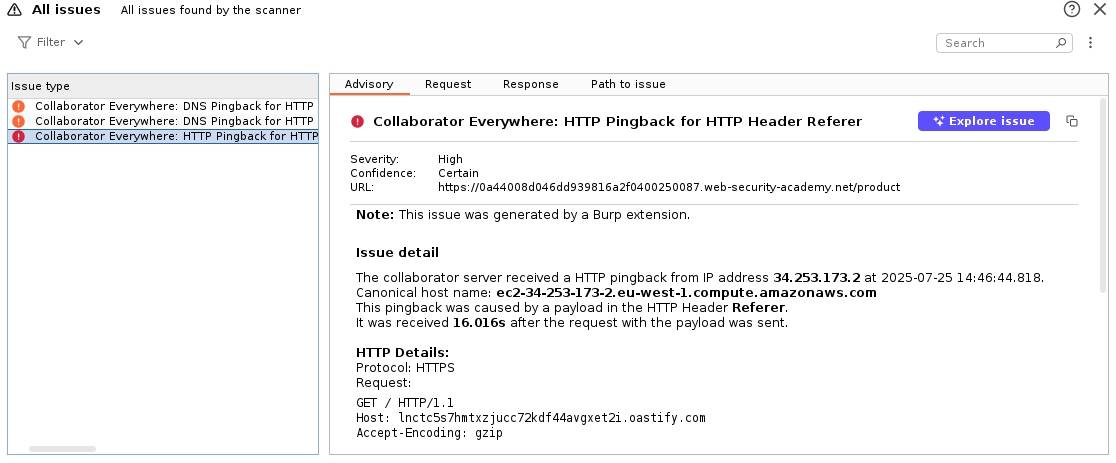
In the Proxy view, requests for which a Collaborator pingback has been received are now highlighted and marked with a comment. This makes it easier to spot interesting requests. However, this behavior can be disabled in the extension’s settings.

Interactions
The new version of the Collaborator Everywhere adds a new tab to the Burp Suite UI for easier access.
Incoming interactions are collected and presented in a table. Additional details such as the original request-response pair and the data sent to the Collaborator server can be displayed by selecting an item. These interactions are stored as persistent data within the project file. Therefore, they are retained even if Burp Suite is closed and reopened again later, or if the extension is disabled and re-enabled .
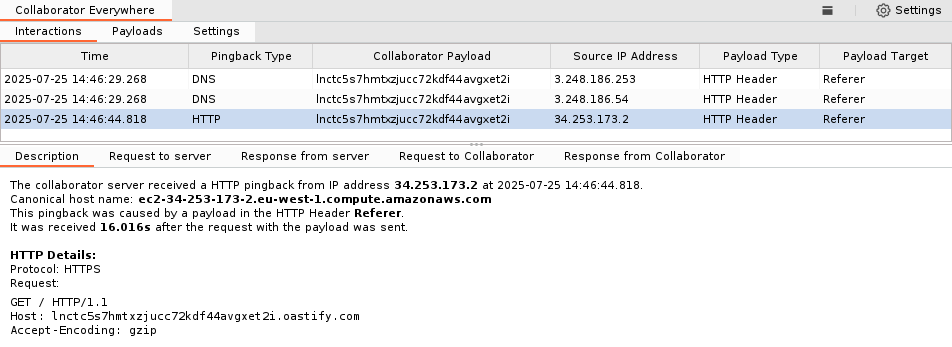
Payloads
The “Payloads” tab is the key element of the extension, providing a convenient overview of the values to be inserted. Payloads can be modified simply by double-clicking on the relevant entry.
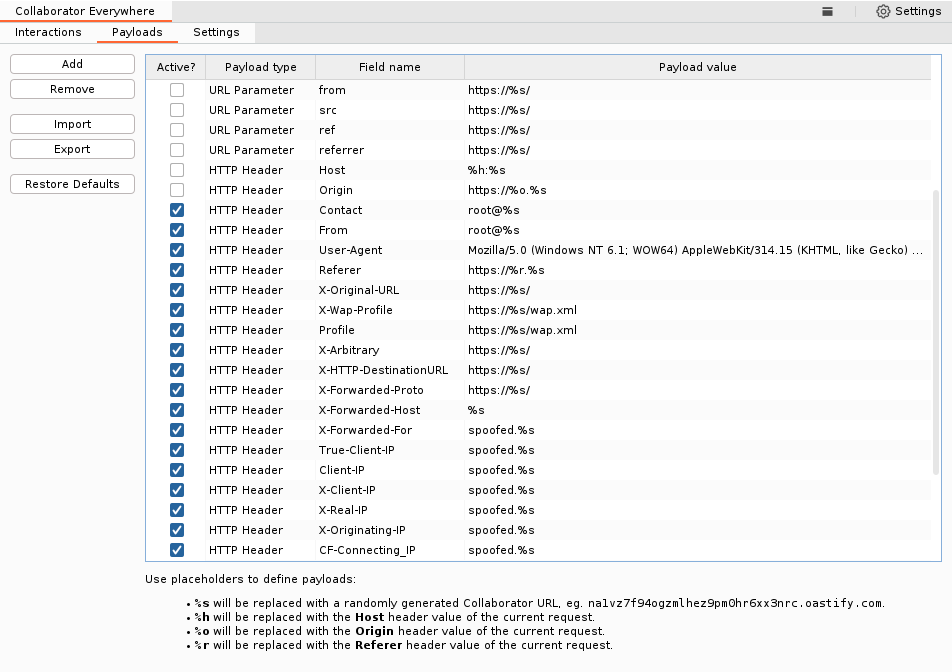
Currently, there are two different payload types implemented. An HTTP Header payload either adds or replaces the current header value with a custom payload. Similarly, a URL parameter payload adds (or replaces) a URL parameter with a custom payload.
Different placeholders can be used in payloads. The most common type is %s which is replaced with a unique Collaborator URL. However, to cover additional use cases such as Host header injections, attacks on vulnerable CORS configurations, or broken Referer-based access control, the placeholders %h, %o and %r will insert the values respectively of Host, Origin or Referer headers from the original request.
Adding a new payload is just as easy:
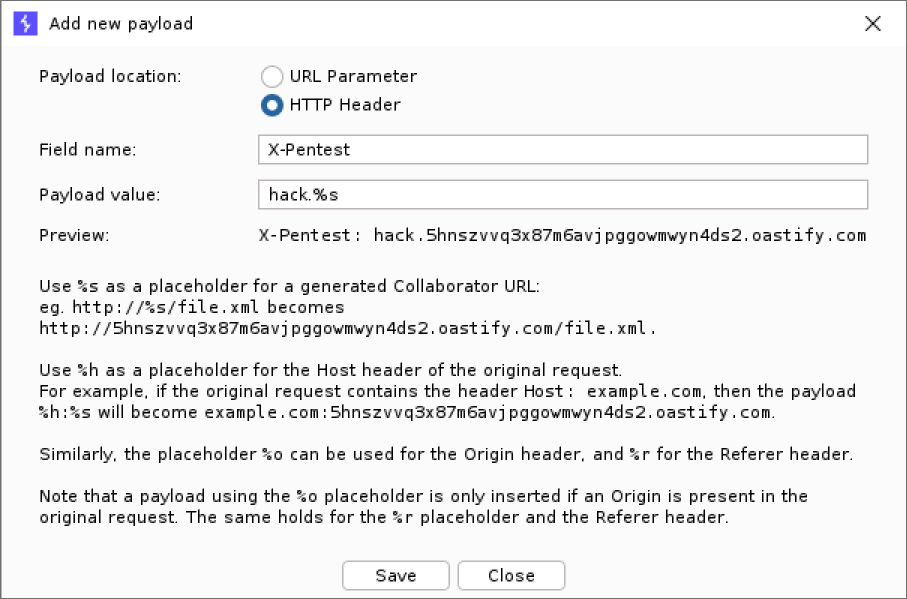
It is possible to switch between different payload sets by exporting the current list and importing a different one.
Other payload sets are available on our GitHub page:
https://github.com/CompassSecurity/CollaboRaider/tree/main/payloads.
Settings
The third tab is used for further configuration and customization. It is possible to adjust the poll interval to the Collaborator server. The extension also determines the user’s public IP address, which enables it to distinguish self-caused pingbacks from remote systems. In this case, it is possible to configure the extension to reduce the severity rating of the issue, or ignore such interactions entirely. The public IP detection can be refreshed, for example when switching to a different VPN during testing. Finally, it is possible to change the color with which requests are highlighted in the Proxy view.
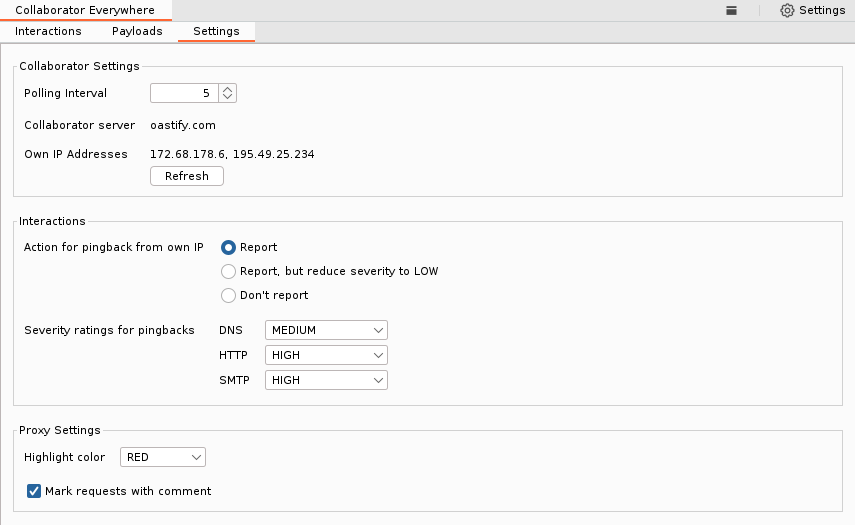
Montoya API
The whole extension has been rewritten using the new PortSwigger Montoya API, which provides additional features, such as persistent storage. Thus, all these settings, including payloads and configurations, are saved persistently across projects.
This blog post only introduced our new features. A future post may cover more examples and an overview of the different payload sets.
Now that you have made it this far, it’s time to install the extension from the BApp Store or on our GitHub repository and find some OOB vulnerabilities!
- We first named our fork CollaboRaider, then PortSwigger merged the changes into a new repository called Collaborator Everywhere v2
(https://github.com/portswigger/collaborator-everywhere-v2).
However, the official name of the extension is still Collaborator Everywhere. ↩︎
如有侵权请联系:admin#unsafe.sh